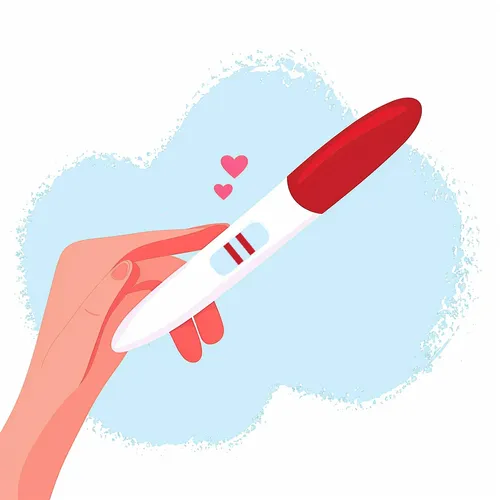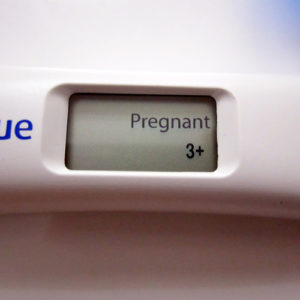All home pregnancy tests work in the same basic way, they all check for the presence of hCG, human chorionic gonadotropin, the pregnancy hormone, in urine. So, how soon will a pregnancy test read positive? Well, this can only occur after your fertilised egg is implanted in the uterus. At this stage hCG starts to be produced, flowing into your blood and then into your urine.
Most modern pregnancy test kits are capable of detecting hCG in urine as soon as 3-4 days after implantation, though it can sometimes takes longer. If you are pregnant, on the day you miss your period about 74% of home pregnancy tests will show a positive result. Thus a negative result is normal in approx. 26% of all pregnancies. You may have to retest again later to get a definitive result.
Once you pass 10 or more days after the missed period, a negative pregnancy test result makes it unlikely that your are pregnant. A positive pregnancy test result can happen any time after a missed period.
The table below shows how soon a pregnancy test will read positive, dependent on the day you take it.
3 days before expected period — 51% positive
2 days before expected period — 62% positive
1 day before expected period — 68% positive
Day of expected period — 74% positive
1 day after expected period — 79% positive
2 days after expected period — 85% positive
3 days after expected period — 90% positive
7+ days after expected period — 96% positive
Factors That Determine a Positive Result
The timing of implantation is a factor. hCG can normally be picked up in the bloodstream between 9 and 16 days after ovulation has taken place. Urine hCG can normally be seen about two to three days after blood hCG first appears.
However, it is important to note that implantation timing can vary from person to person. Some may experience implantation as early as six days after ovulation while others may not experience it until 12 days after ovulation. The timing of implantation can also affect the accuracy of hCG tests.
In some cases, a woman may experience implantation bleeding which can be mistaken for a light period. This can cause confusion when trying to determine when to take a pregnancy test. It is recommended to wait a few days after experiencing implantation bleeding before taking a test to ensure accuracy.
It is also important to note that hCG levels can vary during pregnancy. In the early stages, hCG levels double every 48 to 72 hours until they peak around eight to 11 weeks gestation. After that, they slowly decline and level off for the rest of the pregnancy.
Urine hCG levels vary during the day. How much you drink will affect the concentration of urine and how quickly you can see a positive result depends on concentration of the urine and quality of the early pregnancy test. You’ll typically get the most accurate results by testing first thing in the morning, when your urine is most concentrated after a night’s sleep. If you’re dying to test later in the day (we get it, the suspense is real!), try to hold your urine for at least four hours and limit your fluid intake beforehand.
We always recommend using a reliable brand of pregnancy such as those made by Clearblue, First Response or Zoom Baby.
The sensitivity of the pregnancy test is also critical. Different tests have different sensitivities and that will affect how early can pregnancy be detected. Test sensitivity is measure in mIU/mL. The lower the number, the less hCG required to produce a positive test. Thus a 20 mIU/mL test will be more sensitive to hCG than a 40 mIU/mL one, maybe showing a positive days before the less sensitive test detects it. Early pregnancy tests, with low mIU/mL cut offs would include the First Response Early Results Pregnancy Test, the Clearblue Early Detection Pregnancy Test and the Clearblue Digital Early Detection Pregnancy Test.
Factors That Can Affect Test Accuracy
While home pregnancy tests are generally reliable, certain factors can influence their accuracy. For example, if you take the test too early, before there is enough hCG in your urine, you may get a false negative result. It’s best to wait until at least the first day of your missed period to test.
Certain medications, such as fertility drugs containing hCG, can cause false positive results. Rarely, medical conditions like ovarian cysts or ectopic pregnancy may also lead to misleading test results.
When to See a Doctor
If you get a positive home pregnancy test, it’s important to follow up with your healthcare provider. They can confirm the pregnancy with a blood test and physical exam. Your doctor will also calculate your due date and discuss prenatal care.
Even if your home test is negative but you still suspect you may be pregnant (for instance, if you have missed a period or have other symptoms), it’s wise to check in with your doctor. They can perform a more sensitive test to verify whether you are pregnant.
Photo credit; “Two Lines 😊” by Anthony Cunningham for Zoom Baby
Zoom Baby is a leading supplier of Pregnancy Tests and Ovulation Test Kits





